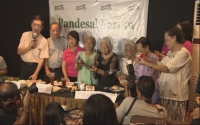By the numbers: The Tea Party

The battle for the soul of the Republican Party played out in some pockets of the country on Tuesday, presenting the first true test for the tea party since their congressional kinsmen helped shut down the government last month.
But little was resolved. Democrat Terry McAuliffe barely scratched out a win against tea party darling Ken Cuccinelli to be the next governor of Virginia. Establishment Republican Bradley Byrne defeated tea party favorite Dean Young in a special congressional primary in Alabama. But the margin of victory was narrow, even though Byrne had the support of the U.S. Chamber of Commernce and twice the campaign cash, and according to Young, the national tea party groups had "abandoned" his race.
Tea party and establishment Republicans continue to wrestle over the political future of the GOP, but it's difficult to tally up the score. The tea party remains an amorphous movement, but now national politicians and big money groups are carrying its flag. To better grasp the current state of the tea party, America Tonight looks at how its shape and influence has changed:
The tea party is almost 5 years old
Some peg its birth date to the "Porkulus Protest" in Seattle on Feb. 16, 2009, which rallied against the stimulus package. Others point to an impassioned call for a Chicago "tea party" three days later by CNBC Business News editor Rick Santelli on the floor of the Chicago Board of Trade. Within a day of the video going viral, tea party websites began to spring up.
In April 2009, 'tea party' peaked on Google
The country took quick notice of the fledging tea party, Googling the term en masse within weeks of the movement's birth.
22 percent of Americans are tea party supporters
In a September Gallup poll, 22 percent of Americans said they were a supporter of the tea party movement, almost hitting its record low two years ago. Eleven percent called themselves strong supporters.
Tea party supporters make up half of voters in Republican primaries
While 38 percent of Republicans support the tea party, according to that same Gallup poll (compared to 6 percent of Democrats), around half of voters in Republican primaries are supportive of the tea party, says Vanessa Williamson, a government and social policy Ph.D. student at Harvard University and co-author of "The Tea Party and the Remaking of Republican Conservatism."
"If you have power there," says Williamson, "you really have power in the party."
27 percent of Americans oppose the tea party
Over a quarter of Americans, and over half of Democrats, considered themselves opposed to the tea party in September, the Gallup poll found. Opposition climbed slightly over the last year, but is 3 percentage points lower than its peak in June 2010.
49 percent have an unfavorable view
That's the highest it's ever been, according to an October Pew Research Center poll conducted during the government shutdown. Negative opinion has been on a sharp uptick since June. Positive opinion has also been on a slide, and now stands at 30 percent.
40 tea party Republicans won House seats in 2010
The 2010 midterm elections were the first opportunity for the tea party to get their interests represented on the national stage. One hundred and thirty tea party-backed Republicans ran for House seats, reported NBC News, and 40 won, as did five of the 10 tea party candidates vying for the Senate, including Rand Paul (R-KY), Marco Rubio (R-Fl.) and Mike Lee (R-Utah).
"Tea party-backed" is always a murky term, however. "If you’re talking about Ted Yoho, a guy who had never run for political office in his life and used to be a veterinarian, that's a real grassroots tea party guy," says Williamson. "Or someone who recieved funding from FreedomWorks, which is funded by Dick Armey, former House majority leader, we’re not talking about an insurgency here. So I don’t think that's a measure that’s meaningful."
59 Republicans belonged to the Tea Party Caucus
The Tea Party Caucus is now defunct, but there were 59 congressional members before the 2012 election, says Gary Jacobson, a political science professor at University of California, San Diego. Since the caucus gathered steam ahead of the election, he said, this likely represented its peak.

In 2010, there were nearly 1,000 local groups
As of 2010, the number of local grassroots groups reached close to an impressive 1,000, says Williamson. And these were active groups that held regular meetings, she adds, "not just a guy with a website."
But an estimated 500 groups are now considered 'active'
The number of active groups has likely halved by this point, according to Williamson, and "that’s a very optimistic estimate."
Tea party supporters are older than 45
Mostly. Tea partiers are also better-educated and wealthier than the average American, according to a 2010 New York Times/CBS poll. They also lean white and male.
In 2012, two tea party leaders in Congress lost re-election
Reps. Allen West (R-Fla.) and Joe Walsh (R-Ill.), who won seats in the 2010, lost their re-election bids two years later. Rep. Michele Bachmann (R-Minn.) squeaked a victory by just 3,000 votes and Richard Mourdock, the the Tea party-challenger for the Senate in Indiana, once favored for the win, lost after facing widespread condemnation for his remark that pregnancy from rape was "something God intended."
The Senate Tea Party Caucus now has 5 members
The group includes Ted Cruz (R-Texas), Mike Lee (R-Utah), Jerry Moran (R-Kan.) Rand Paul (R-Ky.), and Tim Scott (R-S.C.).
12 senators attended a Tea Party Caucus meeting in July
The meeting signalled a more mainstream embrace of the tea party. Senate Minority Leader Mitch McConnell hosted, reported Politico, and John McCain (R-Ariz.) was in attendance.

80 representatives sided with tea party-backed Rep. Mark Meadows in Obamacare battle
The support came for the North Carolina Republican's August letter urging the House GOP leadership to defund Obamacare.
There are between 50 and 80 'serious tea party types' in Congress
"They’re sincere," Jacosbson says. "They’re true believers."
'Tea party' was said 463 times on the House and Senate floors in October
That was the most times the term has been used in any month since the modern tea party movement was born.
Democrats have said 'tea party' three times as often as Republicans in Congress

Senate Majority Leader Harry Reid (D-Nev.) has uttered the phrase "tea party" the most, followed by Sen. Sheldon Whitehouse (D-R.I.) and Sen. Charles Schumer (D-N.Y.). Among Republicans, Rep. Louie Gohmert (R-Texas) and Rep. Steve King (R-Iowa) are the most common invokers of the tea party on the House floor.
$15 million raised by FreedomWorks

In 2012, the tea party-aligned FreedomWorks, the advocacy group that "has done more than any other organization to build the tea party movement," according to The New York Times reported in 2010, raised 50 percent more than the year before. $8.9 million of that came from four donors who gave at least $1 million a piece.
Tea party friend Gregg Abbott has sued the federal government 27 times
Abbott, the attorney general of Texas, hopes to succeed Rick Perry as the state's governor.






















Error
Sorry, your comment was not saved due to a technical problem. Please try again later or using a different browser.